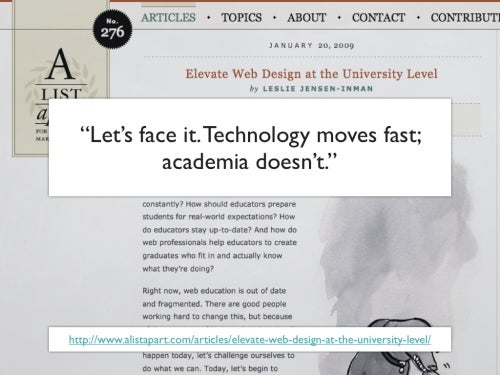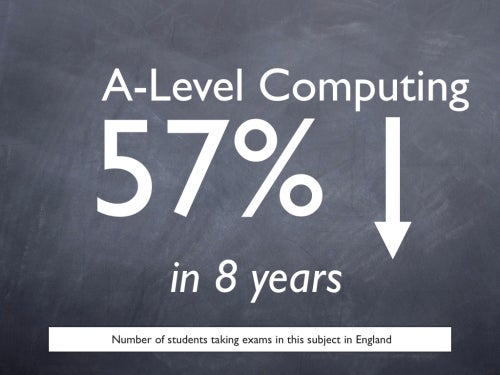Anna Debenham brought the house down with this outstanding presentation at the Mozilla Drumbeat Festival. The key take-away: web education in too many schools—both at the high school and university level—is out of date, lousy, and losing students. So much so that it's threatening our countries' digital and economic futures.
A failing grade for teaching the web
Some highlights from Anna's talk:
- Younger students often have nowhere to turn if they want to learn web design or development. Serious training often isn't available until the post-secondary level — despite the fact that the most talented developers (like Anna herself) start early. Matt Mullenweg, for example, created WordPress.com before he could legally drink. And Anna's colleagues launched their own online business (UploadRobots.com) while still in the fifth grade.
- High school and university curricula is often out of date, teaches bad practice, or is just plain wrong. The official UK high school curriculum, for example, instructs students in cutting-edge practices like "the use of tables to position text and graphics" and "using Microsoft Word or PowerPoint to create web pages." And the largest academic institution in Europe lags behind Wikipedia in defining basics like HTML.

- Students are dropping out as a result. Not surprisingly, studies report that the best students are "insufficiently challenged" by the poor quality of what's offered. The number of UK students taking A-level computing courses has dropped 57% in 8 years. And the number of UK girls studying computing beyond age 16 has dropped to an all-time low.

- Schools confuse office drudgery for real webcraft. Instead of helping students build creative lives and careers on the web, too many schools stick kids in front of a PC with proprietary productivity tools for office drones — teaching them to passively consume technology instead of creating it. In one teacher's words: "All we're gearing our kids up for is a life in an office. No wonder there's no stampede for that career path."
- All this education fail translates into economic fail. Europe, for example, is facing a shortage of 70,000 skilled workers in the tech sector in 2010. The UK's Royal Society says the sorry state of computer science in schools is "damaging to the UK's future economy... We are now watching the enthusiasm of the next generation waste away through poorly conceived courses and syllabuses."
Web education that's more like the web?
The Drumbeat Festival was full of folks tackling these and related problems. But Anna's examples paint a pretty grim picture: current web education practices in schools resemble teaching the use of bloodletting in medicine or instructing automotive students in the wonders of the Model T.
One thing seems certain: for the system to improve, it'll take communities of young innovators like Anna helping to reinvent and update not only schools' curricula, but their overall approach to teaching the web. Replacing top-down models with more fluid, peer-led classes where teachers can accept and make a virtue out of the fact that many of their most talented students will know more than they do. Creating those solutions in an open and scalable way would be a massive but worthwhile undertaking. Could be a great potential Drumbeat project?
First published in: o p e n m a t t







19 Comments